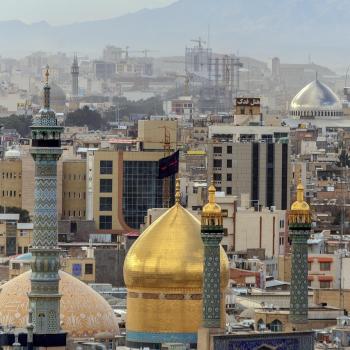Lectionary Reflections
Matthew 4:12-23
January 26, 2014
I attended a lecture by the author Erik Larson a few years ago. It was held at a large downtown church and the place was filled. He told of how his readership had taken time to develop. When he wrote his first book, his publicist set up a book tour of major cities. In one venue, he walked into the auditorium and took his place at the podium up front, only to find, as he peered out into the cavernous room, that there was only one person present. One woman sat in the back row. He smiled at her and said, "It's good to see you this evening. Why don't you move up here closer to the front?" She replied, "No, I'll stay put. I might want to leave early."
In our passage from Matthew, there is no leaving early. There is no staying put. There is only "all in" for a risky ministry following a fearless teacher, healer, Messiah.
With startling suddenness, Matthew announces John's arrest (4:12). The word for "arrest" is "handed over," and it is repeatedly used to describe Jesus' own deliverance into the hands of his enemies (17:22, 20:18, 26:2). (Donald Senior, Matthew, 61-6) The announcement, with its heavy implication that as John goes, so will Jesus, casts an urgent shadow over Jesus' future path.
Hearing the news of his cousin's imprisonment is the catalyst for Jesus' beginning his risky ministry. Matthew shapes this story of the call of the first disciples for his community. We can see key differences between his account and Mark's that highlight the way Matthew would like for disciples to respond to Jesus' call on their lives.
1) To be a disciple means to go all in for a ministry to the least and the lost. We don't get to choose who is worthy of Jesus' attention, of receiving the Messiah's light. We are just to reflect it to everyone we meet. Disciples respond by acknowledging that the message is for Gentiles as well as Jews, Jews as well as Gentiles. Matthew is writing near the end of the first century to a mixed congregation of Jews and Gentiles, each of whom questioned the status of the other. Matthew enriches Mark's account of the beginning of Jesus' ministry by referring to Isaiah 8:23-9:1 (Senior, Matthew, 61).
There will be no gloom for those who were in anguish. In the former time he brought into contempt the land of Zebulun and the land of Naphtali, but in the latter time he will make glorious the way of the sea, the land beyond the Jordan, Galilee of the nations. (Is. 9:1-2a)
Matthew describes Jesus as setting up a home base for his ministry in Capernaum, the land of Zebulun and Naphtali, the first two of the northern kingdoms to be deported in the Assyrian invasion of 721 B.C.E. The Isaiah reference signals that here is the Messiah whose ministry will focus on the lost and forgotten within the Jewish people. It also mentions "Galilee of the nations" (Is. 9:2a = Matthew's 'Galilee of the Gentiles,' Mt. 4:15). At the very beginning of his ministry, despite the initial focus on Israel alone (10:5, 15. 24), Matthew's Jesus anticipates the breakout of the mission to the nations (28:16-20).
So, if as a member of Matthew's community or as a contemporary reader, you want to go "all in" rather than sit in the back row, you need to sign up for a ministry on behalf of those who sit in darkness, whatever their backgrounds and perspectives.
2) To be disciples means to go all in and Repent! To repent is to make a turnaround (metanoia). Matthew is working from Mark's account of the beginning of Jesus' ministry. Mark summarizes Jesus' preaching as "The time is fulfilled and the reign of God has come near; repent, and believe in the good news" (Mk. 1:15). Matthew reads, "Repent for the reign of heaven has come near" (Mt. 4:17). Matthew has moved the word repent to the opening of the proclamation, giving it added emphasis (O. Wesley Allen, Matthew 47). Jesus' words in Matthew 4:17 are an exact parallel to John's proclamation in Matthew 3:2. With John silenced in prison, Jesus, in 4:17, is moved to initiate his own public ministry with the very same words John used in 3:2. "Repent, for the kingdom of heaven has come near."
Following Jesus means to repent for the here and now, not the then and there. If, as disciples, we are going to commit to a ministry to the forgotten and those sitting in darkness, we need to realize that our discipleship is for the here and now, not the then and there. It is motivated by compassion for this world, not our concern with our own reward or punishment in a future realm. It is often noted that Matthew used the term "kingdom of heaven" rather than "kingdom of God." Many readers assume Jesus was talking about heaven in the popular sense of a place souls ascend to after death. (Allen, 48) But Matthew's use of the term "kingdom of heaven" doesn't refer to a purely future, otherworldly locale. It is his way of saying "kingdom of God" out of reverence for the Sovereign Creator. Since names were believed to convey the nature and essence of the one named, they were was not to be used lightly.





